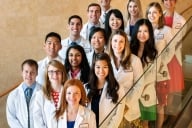You have /5 articles left.
Sign up for a free account or log in.
In a major policy shift, the Icahn School of Medicine at Mount Sinai Wednesday announced that it will fill half of its entering class going forward by admitting college sophomores -- three years before they would enroll in medical school -- and will do so without requiring traditional pre-med course requirements and the Medical College Admission Test (MCAT).
In what a press release called the beginning of a “fundamental shift,” sophomores will be admitted to “FlexMed,” a new program in which they will spend the rest of their undergraduate time in tracks such as computational science/engineering, biomedical sciences and humanities/social sciences. Students will be encouraged to take courses in biostatistics, ethics, health policy and public health. These courses would replace the traditional pre-med science requirements.
Students will also be encouraged, but not required, to become proficient in Spanish or Mandarin.
David Muller, Mount Sinai’s dean of medical education, said in an interview that although requirements issues had been “written about for years and years... there’s been either an inertia or a reluctance to take a first step and break down the model and try something new. What I hope will happen is that this program will prove very successful and prove decisively that it’s a viable alternative.”
Mount Sinai has had a similar program on a much smaller scale in the past, and says it has been a success.
Explaining the rationale behind the decision to take a small program and apply it to half of the class, Muller said that pre-med science requirements tend to be “science that is not the most applicable to current clinical or translational research; it’s not unimportant science, but it’s kind of outdated.”
The announcement comes at a time that the MCAT itself is changing in ways that reflect some of the concerns raised by Mount Sinai; last year saw the first major amendments made to the exam since 1991, with a plan to add sections on critical thinking and social sciences.
“I don’t think of the MCAT as something that should be eliminated; I think the efforts to rethink the MCAT are admirable,” Muller said. “[The revision] was a very thoughtful process, and yet the MCAT didn’t eliminate some things that are really not that relevant to medical school. It really just sort of begins to scrape away at the iceberg of what we really need to do.” Muller added that he thinks an over-reliance on the exams has developed. “The use of the MCAT, I think has really been warped over the course of time,” he said.
Muller also said that the current medical education model fails to take into account changes in the medical and technological landscape. “All of science has changed, even if you went back 50 years,” Muller said. “The science that has had the most impact… is completely different.” For example, Muller said, when he was attending medical school, “the whole concept of information technology didn’t exist… we trained at a time that there was no such thing as a computer that you had [personal] access to.”
Robert Schaeffer, public education director of the National Center for Fair and Open Testing, which has been a frequent critic of the MCAT, and of standardized testing in general, called the move “definitely a step in the right direction.” Schaeffer said that the alteration of requirements “moves Mount Sinai into the national leadership of medical school admissions reform. [The decision] indicates that they recognize the importance of multiple measures to assess for medical school.”
Although he said it was hard to predict the best course of action before any data on the program was in, Muller said that “if we get to the point where we see that there is equivalence between the two groups… we might actually consider increasing it to a larger proportion of the class or the whole class.”
“Medical schools can change their requirements at any time based on their environment and the mission of the institution,” said Geoffrey Young of the Association of American Medical Colleges, which is responsible for the composition and administration of the MCAT. “The AAMC commends innovation in the medical school admissions process.”
“Our hope is that this proves to be a viable alternative to the traditional path,” Muller said. “It’ll really all depend on the data.”



